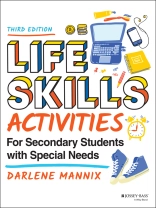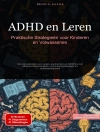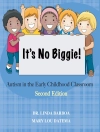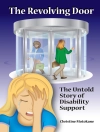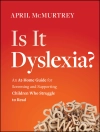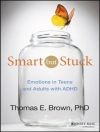Help students with special needs thrive with over 160 updated educational activities
In the newly revised Third Edition of Life Skills Activities for Secondary Students with Special Needs, teacher and author Darlene Mannix delivers a unique collection of over 160 updated activity sheets with related exercises, discussion questions, and evaluation suggestions to help students gain basic skills necessary for independence and success. Each activity sheet focuses on a specific skill in a real-world context and includes teacher directions for objectives, introduction, optional extension activities, and assessment methods. This crucial book includes:
- Activity sheets and corresponding introductions in a wide variety of critical life skills such as interpersonal, communication, academic and school, practical living, and more
- Coverage of leisure activities and the importance of finding fulfilling hobbies and pastimes
- Tools to help students build their self awareness and understand their strengths and weaknesses
Perfect for special educators, general education teachers, school counselors, and psychologists, Life Skills Activities for Secondary Students with Special Needs will also earn a place in the libraries of other professionals working with special needs children, as well as the parents of those children.
قائمة المحتويات
About This Book xiii
About the Author xvii
Parent Activities and Suggestions xix
Part One: Self-Awareness 1
Chapter 1: My Personality 3
Lesson 1.1: Optimist or Pessimist? 4
Lesson 1.2: I Am Creative 8
Lesson 1.3: I Like Routine 11
Lesson 1.4: Sometimes I Am Fearful 14
Lesson 1.5: I Can Be a Leader 19
Lesson 1.6. Am I a People Person? 22
Lesson 1.7: I Am a Good Listener Or Am I? 25
Lesson 1.8: Sometimes I Get Angry 28
Lesson 1.9: I Finish What I Start 32
Lesson 1.10: I Am Teachable 37
Chapter 2: My Character 39
Lesson 2.1: What Is Good Character? 40
Lesson 2.2: Honesty 43
Lesson 2.3: Kindness 46
Lesson 2.4: Loyalty 49
Lesson 2.5: Responsibility 53
Chapter 3: Uniquely Me 57
Lesson 3.1: What Are Values? 58
Lesson 3.2: Values Important to Me 61
Lesson 3.3: My Disabilities 64
Chapter 4: Personal Life Choices 67
Lesson 4.1: Smoking and Vaping: Is It for Me? 68
Lesson 4.2: Marijuana and Other Drugs 72
Lesson 4.3: Teens and Drinking 75
Lesson 4.4: Am I Ready to Move Out? 79
Lesson 4.5: Am I Ready to Work Part-Time? 82
Part Two: People Skills 85
Chapter 5: Relating to Others 87
Lesson 5.1: Encouraging Others 88
Lesson 5.2: Being Friendly 91
Lesson 5.3: Helping Others 94
Lesson 5.4: Conflict Resolution 97
Lesson 5.5: Whom Can I Talk To? 101
Chapter 6: Friendship Skills 105
Lesson 6.1: My Peer Groups 106
Lesson 6.2: Who Are My Friends? 109
Lesson 6.3: Making Friends 112
Lesson 6.4: People Who Are Like Me 115
Lesson 6.5: People Who Are Different from Me 118
Lesson 6.6: Social Media 121
Chapter 7: Being Part of a Family 125
Lesson 7.1: My Family Tree 126
Lesson 7.2: Respecting Authority 129
Lesson 7.3: My Parent’s Point of View 132
Lesson 7.4: My Sibling’s Point of View 133
Lesson 7.5: Being Adopted 138
Chapter 8: Communication Skills 143
Lesson 8.1: Best Method to Communicate 144
Lesson 8.2: Summarizing 147
Lesson 8.3: Paraphrasing 150
Lesson 8.4: Is This the Right Time and Place? 153
Lesson 8.5: Verbal and Nonverbal Messages 156
Lesson 8.6: Public Speaking 159
Part Three: Academic and School Skills 163
Chapter 9: Reading Skills 165
Lesson 9.1: Reading for School 166
Lesson 9.2: Reading on the Job 169
Lesson 9.3: Reading for Comprehension 172
Lesson 9.4: Following Written Directions 175
Lesson 9.5: Reading for Pleasure 178
Chapter 10: Writing Skills 181
Lesson 10.1: Everyday Writing Tasks 182
Chapter 11: Math Skills 185
Lesson 11.1: Everyday Math Skills 186
Lesson 11.2: Improving Math Skills 189
Lesson 11.3: Understanding Charts 192
Chapter 12: Study Skills 195
Lesson 12.1: School Tasks for Success 196
Lesson 12.2: Taking Notes 199
Lesson 12.3: Studying Smarter 202
Lesson 12.4: Doing Homework 205
Lesson 12.5: Completing Assignments 208
Lesson 12.6: Rewarding Yourself 211
Lesson 12.7: Good Student Behaviors 214
Lesson 12.8: Requesting Help or Information 217
Part Four: Practical Living Skills 221
Chapter 13: Information Skills 223
Lesson 13.1: What Do I Need to Know? 224
Lesson 13.2: Information from the Internet 227
Lesson 13.3: Information from News Sources 231
Lesson 13.4: Information from Magazines 234
Lesson 13.5: Information from Books 237
Lesson 13.6: Information from Television 240
Lesson 13.7: Information from Other People 243
Chapter 14: Money Skills 247
Lesson 14.1: What Is a Budget? 248
Lesson 14.2: Making a Budget 252
Lesson 14.3: On Sale 255
Lesson 14.4: Unit Pricing 258
Lesson 14.5: How Much Money Will I Need? 261
Lesson 14.6: Banking Options: Checking and Savings 264
Lesson 14.7: Using Debit, Credit, and ATM Cards 267
Chapter 15: Travel 271
Lesson 15.1: Planning a Trip 272
Lesson 15.2: Estimating Travel Costs 275
Chapter 16: Clothing 279
Lesson 16.1: Caring for and Repairing Clothing 280
Lesson 16.2: Buying Appropriate Clothes 283
Lesson 16.3: Organizing Clothes 287
Lesson 16.4: Washing and Drying Tips 290
Chapter 17: Living Arrangements 295
Lesson 17.1: A Place to Live 296
Lesson 17.2: Organizing 299
Lesson 17.3: Apartment Living 303
Chapter 18: Eating and Nutrition 307
Lesson 18.1: Nutrition 308
Lesson 18.2: Making Good Food Choices 313
Lesson 18.3: Eating Out Versus Eating In 316
Chapter 19: Shopping 321
Lesson 19.1: Smart Shopping 322
Lesson 19.2: Comparison Shopping 325
Lesson 19.3: Returning Items 328
Chapter 20: Exercise/Health and Hygiene 331
Lesson 20.1: Exercise Excuses 332
Lesson 20.2: Stressful Situations 335
Lesson 20.3: Depression 340
Part Five: Vocational Skills 343
Chapter 21: Present Skills and Interests 345
Lesson 21.1: My Work Environment Interests 346
Lesson 21.2: Realistic Vocational Goals 349
Lesson 21.3: Working with a Disability 352
Lesson 21.4: Finishing High School 355
Lesson 21.5: Extracurricular Activities 359
Chapter 22: Getting a Job 363
Lesson 22.1: Searching for a Job 364
Lesson 22.2: Vocational Vocabulary 367
Lesson 22.3: Filling Out an Application 372
Lesson 22.4: First Impressions 376
Lesson 22.5: Getting Work Experience 379
Chapter 23: Working 383
Lesson 23.1: Being a Great Employee 384
Lesson 23.2: Handling Criticism on the Job 387
Lesson 23.3: Changing Jobs: Why? 390
Lesson 23.4: Changing Jobs: How? 393
Part Six: Community and Leisure Activities 397
Chapter 24: My Community 399
Lesson 24.1: What Is My Community Like? 400
Lesson 24.2: The History of My Community 403
Lesson 24.3: What’s Going On in My Community? 406
Lesson 24.4: Community Services: People and Places 410
Lesson 24.5: Personal Safety 414
Lesson 24.6: Being a Good Neighbor 418
Lesson 24.7: Community Map 421
Lesson 24.8: Making My Community Better 424
Chapter 25: Leisure Activities 427
Lesson 25.1: Places to Enjoy 428
Lesson 25.2: Hobbies 431
Lesson 25.3: Things to Try! 436
Part Seven: Problem-Solving Skills 441
Chapter 26: Handling Problem Situations 443
Lesson 26.1: Understanding the Problem 444
Lesson 26.2: Coping with Surprises 447
Lesson 26.3: Adjusting to Change 450
Lesson 26.4: When the Problem Is You! 453
Chapter 27: Making Decisions 457
Lesson 27.1: Decision-Making Factors 458
Lesson 27.2: Needs Versus Wants 461
Lesson 27.3: Changing Bad Decisions 465
Lesson 27.4: Why Take Risks? 469
Chapter 28: Resource Management 473
Lesson 28.1: What Are My Resources? 474
Lesson 28.2: Fact Versus Opinion 478
عن المؤلف
DARLENE MANNIX, M.S. has 30+ years of experience as a classroom and resource teacher. She has taught both general education and special education, and has worked with students ranging from learning disabled and mentally challenged to language disordered and severely emotionally disturbed. Mannix is the best-selling author of numerous books for special educators including Social Skills Activities for Secondary Students with Special Needs, Social Skills Activities for Special Children, and Life Skills Activities for Special Children.
